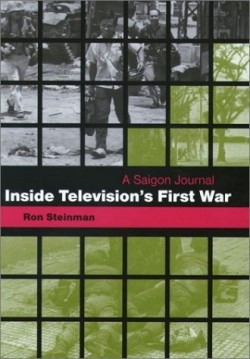
Inside Television's First War
A Saigon Journal
Like the soldiers who fought, the cameramen and journalists of the NBC News Bureau in Saigon-the video grunts of the war-had to adapt to a new type of guerrilla war to survive. The author was only thirty-one when he was appointed Bureau head, a position he held from April 1966 to July 1968. He quickly learned that good news stories came from resourcefulness and instinct. Media technology during “the first television war” was primitive compared with today-videotape, personal computers, and faxes had not been invented, and satellite transmission, the most advanced form of electronic communication, was imperfect.
Steinman, who also wrote The Soldiers’ Story: Vietnam in Their Own Words and Women in Vietnam: An Oral History, presents an insightful and personal account of NBC’s coverage of the war and the Americans and Vietnamese with whom he worked. Included are anecdotes of such colorful figures as Huong Vuong, who introduced the author to South Vietnamese life and such local dishes as soup made from the penis of a water buffalo. Early on, Steinman recognized that knowing the customs of the people made for accurate news articles.
The most fascinating stories are about Josephine, Steinman’s South Vietnamese wife. Her parents readily accepted Steinman into the family, despite the neighbors’ calling Josephine a whore for being courted by an American. She remarkably recovered from a freakish non-combat-related bullet wound to the head, and they eventually settled in New York and raised three children. Nguyen Van Lan, Josephine’s brother-in-law, was an officer in the South Vietnamese army. North Vietnamese communists captured him soon after the Americans departed. He remained a political prisoner, forced to endure horrible conditions and torture in “re-education camps,” until released thirteen years later, in 1988. Steinman’s account of his failed attempt to deliver medicine to him in 1985 is exciting. The author has little regard for South Vietnamese President Thieu and Vice President Ky, both of whom he regards as thieves who deserted Vietnam with much of the country’s material wealth. Unlike the patriotic Lan, they disgraced the country.
The Tet Offensive of January 31, 1968, possibly the most critical battle of the war, is well covered. This event sparked mass student demonstrations, led President Lyndon Johnson to resign from the 1968 presidential race, and discredited the government’s promise that the war would soon be over. More than sixty members of the NBC Bureau provided excellent coverage of the month-long invasion, despite short supplies of food, film, and equipment.
Steinman worked for NBC News for thirty-five years and is currently the co-owner of a production company in New York. He recounts vividly, with pride, the work of the Bureau in providing a video first draft of history, remembers fondly the unsung heroes he worked with, and has not forgotten the unfortunate Vietnamese who suffered the consequences of the war.
Reviewed by
Karl Helicher
Disclosure: This article is not an endorsement, but a review. The publisher of this book provided free copies of the book to have their book reviewed by a professional reviewer. No fee was paid by the publisher for this review. Foreword Reviews only recommends books that we love. Foreword Magazine, Inc. is disclosing this in accordance with the Federal Trade Commission’s 16 CFR, Part 255.
